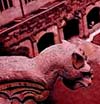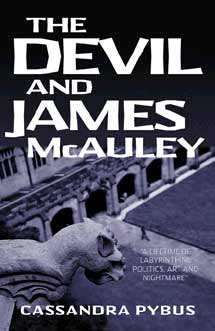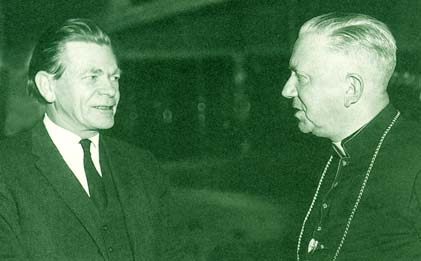|
Clem Christesen, the editor of Meanjin, was well aware of the hostility toward him from the new journal and deeply suspicious of its financial backing. In 1954 he claimed in a Meanjin editorial that the Congress for Cultural Freedom was funded by the CIA, a view he had privately expressed in concerned letters to Sir John Latham. Outraged Krygier intensified his determination to destroy Meanjin. On Krygier’s behalf Bill Wentworth made persistent requests of ASIO [the Australian Security Intelligence Organisation] for the file on Christesen during 1955, and demanded that ASIO do an analysis of Meanjin’s contributors to assess their left-wing connections. In Krygier’s report to Josselson in July 1956, he passed on documents which Colonel Spry from ASIO had pushed under his door one night, naming communists and fellow-travellers at Melbourne University, notably Christesen and his wife, Nina.
In 1956 Josselson agreed to additional funding of $16,100 for an Australian magazine (that is $310 a week) which brought the grant for that year to $94,000. The anticommunist thrust in Quadrant was seen as its selling point, but the magazine did not fare well. By the end of the second year it was $27,000 in debt and in May 1959 Josselson agreed to cover this debt and henceforth he raised the annual subsidy to $33,000. ($635 a week) In 1960, in addition to the increased grant for Quadrant, the Paris office provided $150,000 in grants which included $67,000 for a seminar on Constitutionalism in Asia and the publication of book by the same name, ostensibly by ANU [the Australian National University] Press. Nearly $10,000 was provided to underwrite covert activity against the 1959 Peace Congress in Melbourne.
Quadrant was one of twenty magazines the Congress for Cultural Freedom established in Europe, Africa, Asia and Australia. Within the Secretariat there was an editorial committee to articulate the policy for the magazines. The key players were two CIA agents: John Hunt and Robbie Macauley, editor of the prestigious US literary journal Keynon Review. In correspondence with Hunt and Macauley in 1962, Donald Horne floated the idea of a seminar in Sydney for the editors of all the Congress magazines outside Europe, hosted by Quadrant. Hunt agreed to provide $25,000 in addition to the annual grant of $98,000 for this purpose. Robbie Macauley and William Phillips of Partisan Review (also subsidised by the CIA) came from America, as well as editors from Indonesia, Nigeria, India, Korea and Japan to mingle with an assortment of Australian intellectuals and magazine editors. Clem Christesen declined his invitation.

In 1965 Josselson was persuaded to increase the Quadrant grant to $52,000 per annum ($1000 a week) so that the magazine could become bi-monthly. He agreed to the increase in the hope that McAuley’s anti-communism could be dampened down by the more liberal influence of Donald Horne as co-editor. As Krygier reported to McAuley, Josselson thought Quadrant was ‘too right wing’ and wanted to distance the magazine from regular contributors, such as Bob Santamaria. ‘I intend to ignore all of this’, he wrote from Paris. Donald Horne lasted barely two years before he quit in frustration and was replaced by Peter Coleman.
Seminars on New Guinea, funded to the tune of $76,500, and a Sunday Seminars series organised by Quadrant co-editor Donald Horne, were among several other initiatives that the Paris Secretariat agreed to fund in addition to salaries, office rental, overseas trips and visits from international heavyweights. They also agreed to underwrite a book on the Communist Party of Australia, once again ostensibly published by ANU Press, and they provided a small grant to the magazine Dissent.
By the mid 1960s the CIA was alive to fostering an anti-communism in Asia and so too was Quadrant. In 1964 the magazine began publishing ‘Reports from Vietnam’ which were strongly supportive of the American puppet regime in South Vietnam which was installed by and advised by the CIA. In 1965 McAuley reprinted an article ‘The Real Revolution in South Vietnam’ written by CIA agent, George Carver. At this time McAuley began to work on plans to expand into South East Asia, with Josselson’s support. The Congress for Cultural Freedom provided over $200,000 to its Australian affiliate for various South East Asian projects in 1966: a trip to Vietnam in February for Jim McAuley and half a dozen others. Donald Horne was funded for a trip the following year. A conference on ‘Democracy and Development in South East Asia’, held at the University of Kuala Lumpur and funded by the Congress for Cultural Freedom, followed immediately on the heels of the first Vietnamese visit. Josselson wrote to McAuley to say that he wanted to consolidate the conference by establishing some kind of South East Asian Institute, along the lines of the international institute the Congress funded in Latin America. With less enthusiasm he also agreed to fund a seminar in support of American intervention in Vietnam at Melbourne University and underwrote the publishing cost of the book Vietnam: Seen From East and West nominally published by Thomas Nelson.
|


